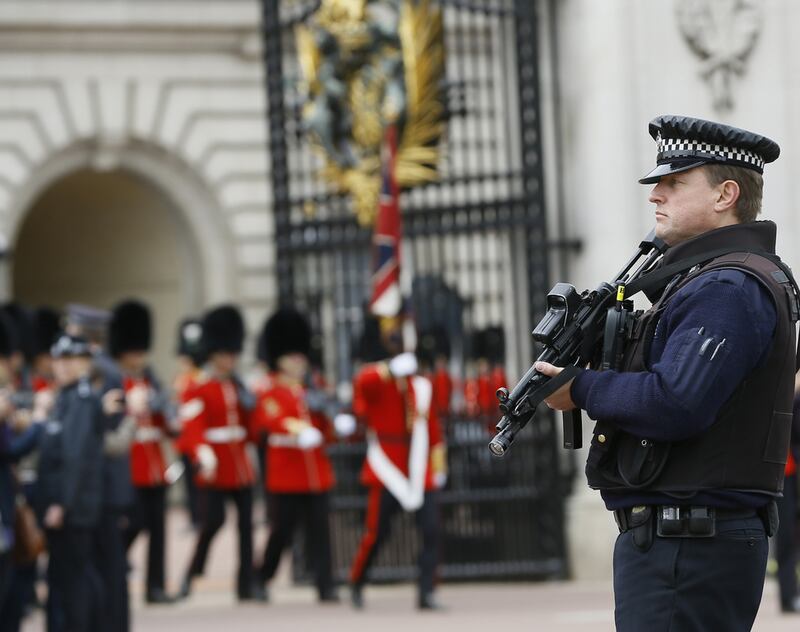LONDON // As four men face charges of plotting to murder police officers or soldiers on London’s streets in the name of ISIL, counter-terrorism officials across Europe say police are increasingly stretched by the volume of cases involving Islamist-related extremism.
Despite relief that one deadly conspiracy may have been foiled, Scotland Yard admits to being under significant pressure from an “exceptionally high” number of inquiries.
In neighbouring countries, notably France and Belgium, police and intelligence services are also fighting an uphill battle to keep abreast of plans for attacks and the constant flow of would-be extremists intent on joining ISIL and other militant groups in Syria and Iraq.
There is concern, too, about the impact on internal security from those who return hardened by conflict, “even more radicalised and with new skills”, according to the EU’s crime intelligence agency, Europol.
Assistant commissioner Mark Rowley, Scotland Yard’s head of specialist operations and Britain’s most senior counter-terrorism officer, has renewed an appeal for public help, especially from the Muslim community, to expose extremists.
“So far this year we have made 218 arrests and are running exceptionally high numbers of counter-terrorism investigations, the likes of which we have not seen for several years,” he said. Mr Rowley cited 100 cases each week of police and other agencies intervening when individuals are suspected of preparing to go to conflict zones. About half of those concerned are referred to deradicalisation programmes.
A specialist police unit is also working with online companies, leading to the removal of more than 1,000 items of illegal content from social media sites each week. These include videos of beheadings and other violence, with 80 per cent of the material related to Iraq and Syria.
Amid this “increasing operational tempo”, Mr Rowley said, several planned atrocities were disrupted each year. “These plots are of varied sophistication, from individuals planning to carry out spontaneous yet deadly attacks to more complex conspiracies. Almost all seemingly are either directed by or inspired by terrorism overseas.”
Evidence of the actions of 16 British citizens while in Syria has been gathered, enabling charges to be brought on their return to the UK.
But emphasising the challenge to resources and operational efficiency, Mr Rowley added: “The volume, range and pace of counter-terrorism activity has undergone a step-change.
“Public safety is our number one priority and we will always focus our disruption activity against those posing the greatest and most imminent threat. Sometimes this means intervening very early – essential to prevent attacks, but presenting enormous challenges in securing sufficient evidence to charge.”
John Schindler, an author and academic who spent 10 years as an intelligence analyst and counter-intelligence officer with the US National Security Agency, claims French law enforcement officers are even more hard-pressed.
On his blog on global security issues, The XX Committee, named after a successful British counter-espionage network of the Second World War, Mr Schindler says France faces danger on an unprecedented scale.
With almost 1,000 French nationals estimated to have been involved in Middle Eastern conflicts in the past two years, he says, French security services are “simply overwhelmed by the number of extremists – known jihadists, would-be jihadists, plus returning jihadists – they need to track”.
Mr Schindler says most are radicalised while still in France. He highlights the case of Mehdi Nemmouche, accused of murdering four people in an attack on the Jewish Museum in Brussels in May.
Nemmouche followed one of the classic routes of would-be militants, graduating from petty crime in his native northern France to radicalisation in jail. After joining ISIL in Syria, where Mr Schindler says he became a “notorious torturer”, he slipped back into Europe, via Germany, without obstruction.
Although he was detained in France just a week after the Belgian shooting, this was a mere stroke of luck for the authorities. He was found to be carrying arms, ammunition and incriminating video equipment during a routine drugs check by customs officers; French reports suggest he was planning another attack, at the annual Bastille Day parade in Paris in July.
The French newspaper L’Opinion quoted Marc Trévidic, a vastly experienced French counter-terrorism judge, as telling a Parisian media association that police and judges were ill-equipped to monitor the scores of recruits returning from conflict.
Contrasting their task with the period prior to the September 11 attacks in the US, Mr Trévidic said: “Today, everything is different. Before, jihad candidates had at least some instruction. Now, there may be no religious background; they are converted by the image. It appeals to emotion, not reason … an explosion due to the internet. The young we deal with are overexcited, not intellectually radicalised.”
But the judge also acknowledged the “disparity” of recruitment, with women and children increasingly figuring among western Muslims heading for Syria.
In the latest London case, one of the four men accused of plotting murder, Tarik Hassane, is not an impressionable teenager or small-time criminal but a medical student. The appeal of the conflict to young people planning careers in caring professions was pinpointed in recent research from a French support group for parents worried about the indoctrination of their teenage children.
Soren Pedersen, chief spokesman for Europol, said Islamist extremism presents “one of the biggest challenges” to police and security services, along with organised crime and the trafficking of drugs and illegal immigrants.
For some smaller nations, such as Belgium and Denmark, the evidence showed disproportionate numbers becoming involved.
“It undoubtedly puts pressure on manpower in all EU countries but is a real priority that has to be taken seriously and is being taken seriously,” he said.
foreign.desk@thenational.ae






